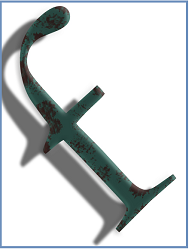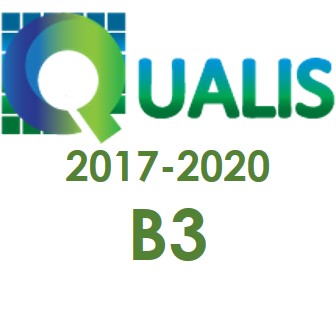MONITORIA EM SALA: UMA AÇÃO DE FORMAÇÃO DOCENTE
DOI:
https://doi.org/10.22481/folio.v12i1.6596Keywords:
PFOL; Monitoria em sala; Identidades docentes; Formação de professoresAbstract
The present text analyzes responses from students of the Portuguese-English course, who acted as in class student-monitors in Portuguese for Speakers of Other Languages (PFOL), from the Federal University of Technology - Paraná, Campus Curitiba (UTFPR-CT). The article seeks to identify the views of student-monitors on the relevance of their participation in the monitorship of PFOL-UTFPR-CT. For this, we organized the text as follows: first, we present the organization of the article, expressing the general idea and exposing the parts that integrate this study. Then, we discuss legal and institutional texts on monitorship and give voice to our perspective of working with in class monitorship. In addition, we establish relationships between monitorship and teacher training by taking into account Lave and Wenger (2001) and Johnson and Golombek (2016) works regarding situated learning; Schön (1992), Pérez Gómez (1992), Gimenez (2005) , Halu (2010) and Zamboni (2013) on their views on reflective teacher and, more specifically, the concepts of reflection in action and reflection on reflection in action, by Schön (1992). The methodology used was an open questionnaire, with 12 questions, from an interpretive perspective (LESSA DE OLIVEIRA, 2008; NEVES, 2015). The analyzes reveal that the monitorship is embedded in the theoretical and practical subjects of the undergraduation course of Portuguese and English (which, many times, are not addressed within the course’s syllabus). In addition, although we find converging points between the responses, we also observe particular identities in each of them.
Downloads
References
2. BALDIN, Fernanda D. C.; CORDEIRO, Elisa N. O Processo de Formação Inicial de Professores de Português para Falantes de Outras Línguas na UTFPR-CT: Integração entre Prática Pedagógica e Teoria. Em: Revista Línguas e Letras, v. 18, n. 39, 2017.
3. BECKER, Marcia Regina; BORK, et. all. O desafio do ensino de português para falantes de outras línguas - PFOL - na UTFPR. Em: Anais do 1º SEI - Seminário de Extensão e Inovação da UTFPR, Curitiba, 2011.
4. BRASIL. DECRETO Nº 3.847, DE 25 DE JUNHO DE 2001. IPI incidente sobre os produtos que menciona, Brasília, DF, mar 2017. Disponível em: <http://www.imprensanacional.gov.br/mp_leis/leis_texto.asp?ld=LEI%209887>. Acesso em: 12 out. 2017.
5. BRASIL. Documento legislador das Atividades do Ensino Superior. Lei Nº 5.540, de 28 de novembro de 1968. Disponível em: <http://www.planalto.gov.br/ccivil_03/Leis/L5540.htm>. Acesso em: 14 abr.2020.
6. BRASIL. Lei de Diretrizes e Bases da Educação Nacional. Brasília, DF, 20 dez 1996. Disponível em: http://www.planalto.gov.br/ccivil_03/Leis/L9394.htm#art92 Acesso em: 14 abr.2020.
7. BRASIL. Regulamento do Programa de Monitoria da UTFPR. Disponível em: http://www.utfpr.edu.br/estrutura-universitaria/pro-reitorias/prograd/programas-academicos/monitoria/arquivos/RegulamentoProgramadeMonitoria.pdf. Acesso em: 14 abr.2020.
8. CELANI, M.A.A. Questões de ética na pesquisa em Linguística Aplicada. Linguagem & Ensino, 2005, vol.8 n.1, jan/jun., p.101-122.
9. FARIA, J.P. A monitoria como prática colaborativa na universidade. Dissertação de Mestrado. Programa de Pós-Graduação em Linguística Aplicada e Estudos da Linguagem. Pontifícia Universidade Católica de São Paulo, 2003.
10. GIMENEZ, Telma. Desafios contemporâneos na formação de professores de língua: contribuições da linguística aplicada. In: FREIRE, Maximina; VIEIRA ABRAHÃO, Maria Helena; BARCELOS, Ana Maria Ferreira (Orgs). Linguística aplicada e contemporaneidade. Campinas: Pontes, 2005.
11. HALU, Regina. Tese de Doutorado: Formação de formadoras de professoras de inglês em contexto de formação continuada (NAP-UFPR). Universidade Federal do Paraná, Curitiba, 2010.
12. JOHNSON, Karen E.; GOLOMBEK, Paula R. Mindful L2 teacher education. New York: Routledge, 2016.
13. LAVE, J.; WENGER, E. Situated learning: legitimate peripheral participation. New York: Cambridge University Press, 1991.
14. LESSA DE OLIVEIRA, Cristiano. Um apanhado teórico-conceitual sobre a pesquisa qualitativa: tipos, técnicas e características. Revista Travessias, v.2, n.3, 2008.
15. NEVES, Miranilde Oliveira. A importância da investigação qualitativa no processo de formação continuada de professores: subsídios ao exercício da docência. In Revista Fundamentos, v.2, n.1, 2015, p. 17-31
16. SCHNEIDER, M.S.P.S. Monitoria: instrumento para trabalhar com a diversidade de conhecimento em sala de aula. Revista Espaço Acadêmico (UEM), v. Mensal, p. 65, 2006.
Downloads
Published
How to Cite
Issue
Section
License












